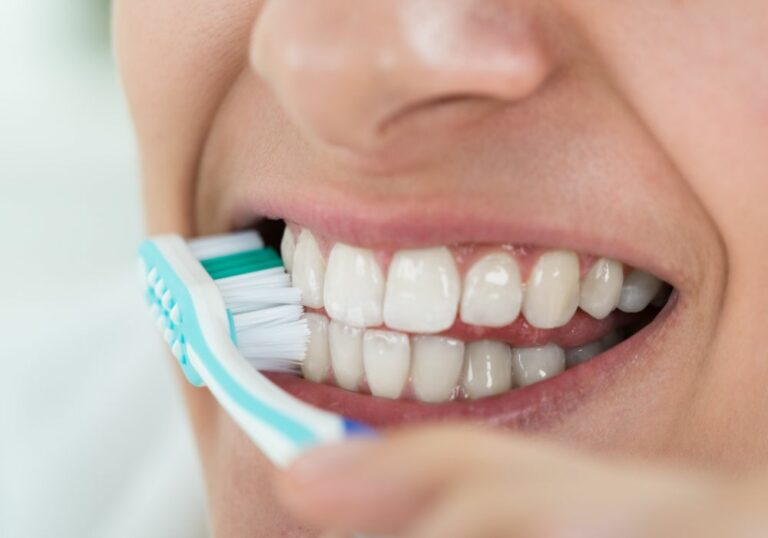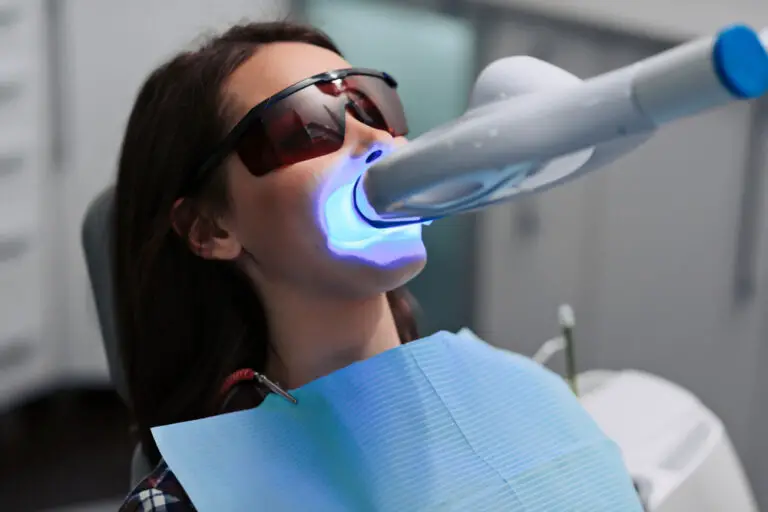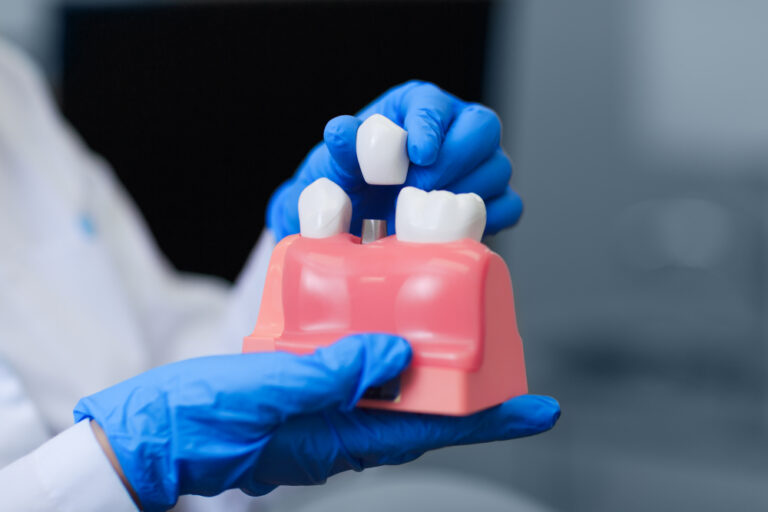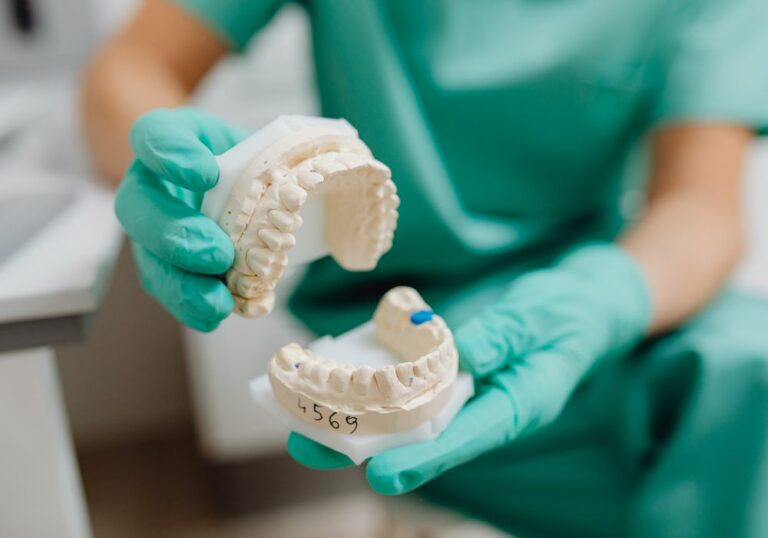Are you a smoker who is concerned about the yellow or brown stains on your teeth? You may be wondering if a dentist can remove nicotine stains from your teeth. The answer is yes, a dentist can help you get rid of these unsightly stains.
Nicotine stains are caused by the chemicals in tobacco and can be difficult to remove with regular brushing and over-the-counter products. However, a dentist can use professional teeth whitening treatments to remove the stains and restore your teeth to their natural color. These treatments are safe and effective, and can give you a brighter, more confident smile. So if you’re tired of hiding your teeth when you smile, it’s time to visit your dentist and ask about teeth whitening options.
Understanding Nicotine Stains
If you are a smoker or use chewing tobacco, you may have noticed that your teeth have become yellow or brownish in color. This discoloration is caused by nicotine stains, which can be difficult to remove. In this section, we will explore the causes of nicotine stains and how they can be prevented.
Nicotine is a highly addictive substance found in tobacco products such as cigarettes, cigars, and chewing tobacco. When you use these products, nicotine is absorbed into your bloodstream and can affect your teeth and gums. Nicotine stains can occur on the surface of your teeth or below the enamel, making them difficult to remove.
The chemicals in tobacco products can also damage your teeth and gums, leading to tooth decay, gum disease, and tooth loss. This is why it is important to quit smoking or using tobacco products as soon as possible.
Nicotine stains can also be caused by other factors such as poor oral hygiene, aging, and certain foods and drinks. For example, coffee, tea, and red wine can stain your teeth over time. However, nicotine stains are typically more severe and difficult to remove than other types of stains.
In the next section, we will explore how dentists can help remove nicotine stains and restore the appearance of your teeth.
Role of Dentists in Removing Nicotine Stains
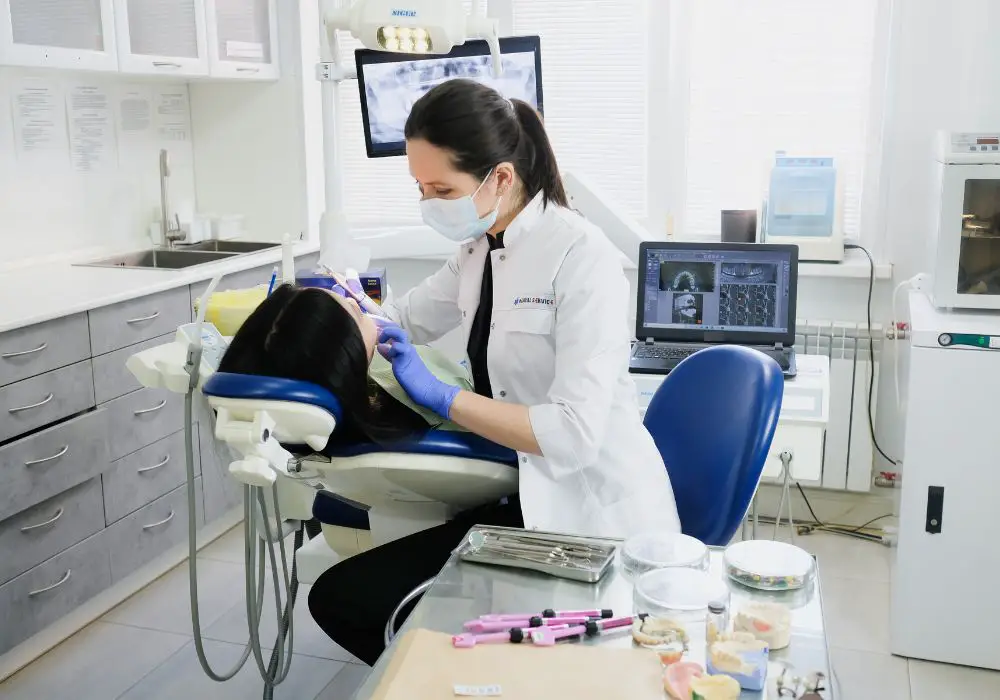
If you’re a smoker, you may have noticed yellow or brown stains on your teeth due to nicotine. While you can try over-the-counter options, dentists can provide professional treatments that can effectively remove nicotine stains from your teeth.
Dentists can offer several options to remove nicotine stains, including:
- Teeth whitening: This is a common treatment that can remove surface stains caused by nicotine. Dentists use a bleaching agent to lighten the color of your teeth.
- Porcelain veneers: These are thin shells that are placed over the front of your teeth to cover up stains.
- Composite bonding: This involves applying a tooth-colored resin to your teeth to cover up stains and improve the appearance of your smile.
- Dental implants: If you’ve lost teeth due to smoking, dental implants can replace them and improve the appearance of your smile.
It’s important to note that the success of these treatments can vary depending on the severity of the stains and your overall oral health. Your dentist can evaluate your teeth and recommend the best treatment option for you.
In addition to professional treatments, dentists can also provide guidance on how to prevent future nicotine stains. They may recommend quitting smoking or using nicotine replacement therapy to reduce the amount of nicotine in your system. They can also provide advice on proper oral hygiene practices and recommend products that can help keep your teeth clean and healthy.
Overall, dentists play an important role in removing nicotine stains from teeth. If you’re a smoker and are concerned about the appearance of your teeth, schedule a consultation with your dentist to discuss your options.
Methods Used by Dentists to Remove Nicotine Stains
If you’re a smoker, you may have noticed that your teeth have become discolored over time due to the presence of nicotine. Fortunately, there are several methods that dentists can use to help remove these stains and restore the natural color of your teeth.
Professional Teeth Cleaning
One of the most effective ways to remove nicotine stains from your teeth is to have them professionally cleaned by a dentist or dental hygienist. During a cleaning, your dentist will use special tools to remove any plaque, tartar, and surface stains from your teeth. This can help to brighten your smile and remove some of the discoloration caused by smoking.
Teeth Whitening
Teeth whitening is another popular method used by dentists to remove nicotine stains from teeth. There are several different types of teeth whitening treatments available, including in-office treatments and take-home kits. Some of the most common options include:
- Custom-fitted whitening trays: These trays are designed to fit your teeth perfectly and are filled with a special whitening gel. You wear them for a set amount of time each day until your desired level of whitening is achieved.
- In-office whitening treatments: During an in-office treatment, your dentist will apply a special whitening gel to your teeth and use a special light to activate the whitening agents. This can help to remove deeper stains and provide more dramatic results.
- Over-the-counter whitening products: There are also several over-the-counter whitening products available, such as whitening strips and gels. While these products can be effective, they may not be as strong as professional treatments and may take longer to achieve results.
Dental Veneers
For more severe cases of nicotine stains, dental veneers may be recommended. Veneers are thin, custom-made shells that are bonded to the front of your teeth to improve their appearance. They can be used to cover up severe discoloration, chips, cracks, and other cosmetic issues. While veneers can provide a dramatic improvement in the appearance of your smile, they are also more expensive and require more extensive dental work than other methods.
Overall, there are several methods that dentists can use to help remove nicotine stains from your teeth. By working with your dentist to find the best treatment for your needs, you can achieve a brighter, healthier smile and reduce the negative effects of smoking on your oral health.
Preventing Nicotine Stains

If you’re a smoker, you’re probably aware of the negative impact smoking can have on your teeth. Nicotine and tar from tobacco can cause yellow or brown stains on your teeth, which can be difficult to remove. However, there are steps you can take to prevent nicotine stains from forming in the first place.
Oral Hygiene Practices
Good oral hygiene is essential for preventing nicotine stains on your teeth. Brushing your teeth twice a day with a fluoride toothpaste can help remove surface stains and prevent the buildup of plaque. Flossing daily can also help remove plaque and prevent gum disease, which can lead to tooth discoloration.
Consider using a whitening toothpaste, which contains mild abrasives that can help remove surface stains. However, be aware that these toothpastes may not be effective at removing deeper stains caused by smoking.
Regular Dental Check-ups
Regular dental check-ups are important for maintaining good oral health and preventing tooth discoloration. Your dentist can identify early signs of tooth discoloration and recommend treatments to prevent further staining.
Professional teeth cleaning can also help remove surface stains and prevent the buildup of plaque and tartar. Your dentist may also recommend teeth whitening treatments to remove deeper stains caused by smoking.
Quitting Tobacco Use
The most effective way to prevent nicotine stains on your teeth is to quit smoking or using other tobacco products. Quitting smoking can be challenging, but there are many resources available to help you quit, including nicotine replacement therapy, counseling, and support groups.
In addition to preventing tooth discoloration, quitting smoking can also improve your overall health and reduce your risk of developing serious health conditions such as lung cancer, heart disease, and stroke.
By following good oral hygiene practices, scheduling regular dental check-ups, and quitting tobacco use, you can prevent nicotine stains on your teeth and maintain a bright, healthy smile.
Benefits of Removing Nicotine Stains
If you’re a smoker or use other tobacco products, you may have noticed that your teeth have become discolored over time. Nicotine stains can be unsightly and affect your confidence. However, there are several benefits to removing nicotine stains from your teeth.
Improved Appearance
The most obvious benefit of removing nicotine stains from your teeth is that it can improve your appearance. Nicotine stains can make your teeth look yellow or brown, which can be unattractive. By removing these stains, you can restore your teeth to their natural color and improve your smile.
Increased Confidence
When you have nicotine stains on your teeth, you may feel self-conscious about smiling or talking in public. Removing these stains can help boost your confidence and make you feel more comfortable in social situations. You may find that you smile more often and feel better about yourself overall.
Better Oral Health
Nicotine stains can also be a sign of poor oral health. Smoking and using tobacco products can increase your risk of gum disease, tooth decay, and other oral health problems. By removing nicotine stains, you may be taking a step towards improving your oral health and reducing your risk of these issues.
Professional Treatment Options
There are several professional treatment options available for removing nicotine stains from your teeth. Your dentist may recommend teeth whitening, which can be done in-office or with take-home kits. Other options include dental bonding, veneers, and crowns. Your dentist can help you determine which option is best for you.
At-Home Treatment Options
In addition to professional treatment options, there are also several at-home treatment options available for removing nicotine stains. These include whitening toothpaste, whitening strips, and whitening pens. While these options may not be as effective as professional treatments, they can still help improve the appearance of your teeth.
Overall, there are several benefits to removing nicotine stains from your teeth, including improved appearance, increased confidence, and better oral health. Talk to your dentist about the best treatment options for you and start enjoying the benefits of a brighter, healthier smile.
Risks and Considerations in Nicotine Stain Removal
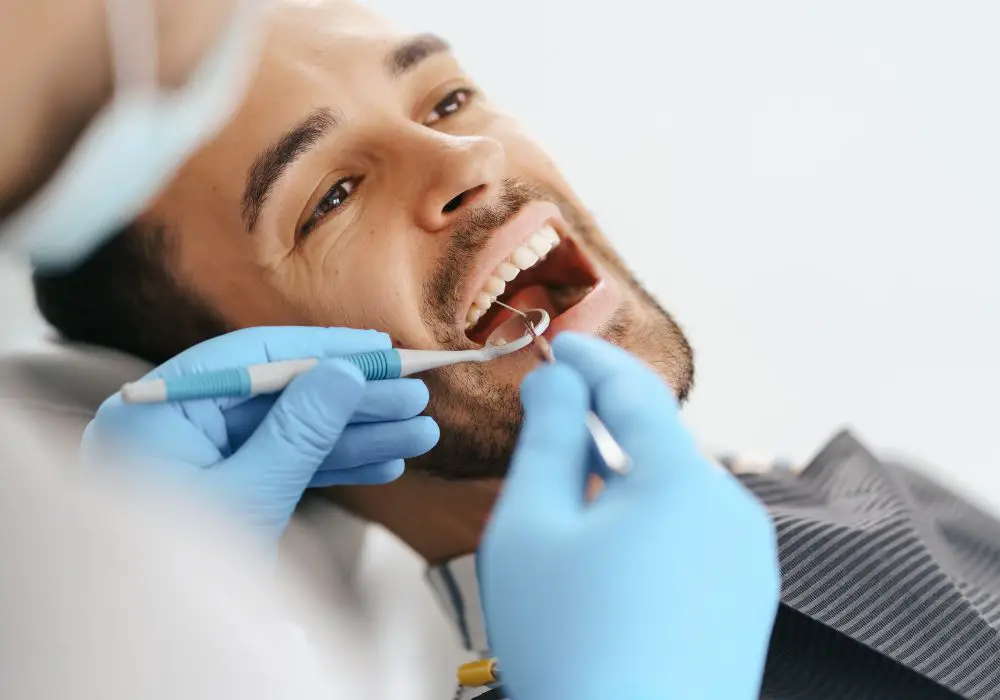
If you’re considering removing nicotine stains from your teeth, there are a few risks and considerations to keep in mind. Here are some important things to keep in mind before you start the process:
1. Damage to Enamel
Nicotine stains can be difficult to remove, and some methods of removal can damage the enamel of your teeth. Enamel is the hard, protective layer that covers your teeth, and once it’s gone, it’s gone for good. If you’re not careful, you could end up with weakened teeth that are more prone to cavities and other dental problems.
2. Sensitivity
Removing nicotine stains from your teeth can also make your teeth more sensitive. This is because many of the methods used to remove stains involve bleaching agents or other chemicals that can irritate your teeth and gums. If you already have sensitive teeth or gums, you may want to talk to your dentist before attempting to remove nicotine stains.
3. Cost
Nicotine stain removal can be expensive, especially if you opt for professional treatments like laser whitening or veneers. Before you start the process, make sure you’re prepared to pay for the treatments you need. You may also want to check with your insurance provider to see if they cover any of the costs.
4. Lifestyle Changes
Finally, it’s important to remember that removing nicotine stains from your teeth is only half the battle. If you continue to smoke or use other tobacco products, your teeth will quickly become stained again. To maintain a bright, healthy smile, you’ll need to make some lifestyle changes and quit smoking or using tobacco products altogether.
Frequently Asked Questions
Can a dentist help remove nicotine stains from teeth?
Yes, a dentist can help remove nicotine stains from teeth. They can provide professional cleaning and whitening treatments to remove surface stains and improve the appearance of your teeth. Additionally, they can offer advice on how to maintain good oral hygiene to prevent further staining.
What are some effective ways to remove tobacco stains from teeth?
Some effective ways to remove tobacco stains from teeth include brushing with baking soda, using whitening toothpaste, and using over-the-counter whitening strips. Professional dental cleaning and whitening treatments can also be effective.
Is it possible to remove deep tobacco stains from teeth?
While deep tobacco stains can be more difficult to remove, professional dental cleaning and whitening treatments can still be effective. In some cases, more intensive treatments such as veneers or bonding may be necessary.
Can nicotine permanently stain your teeth?
Nicotine can cause permanent staining of teeth if it is not addressed promptly. However, with proper oral hygiene and regular dental cleanings, it is possible to prevent and remove nicotine stains.
How can dentists help remove stains on teeth?
Dentists can help remove stains on teeth through professional cleaning and whitening treatments. They may also offer advice on how to maintain good oral hygiene to prevent further staining.
What toothpaste is best for removing nicotine stains from teeth?
There are several toothpastes available that are specifically designed to help remove nicotine stains from teeth. Look for toothpastes that contain baking soda or hydrogen peroxide, as these ingredients can help to whiten and brighten your teeth. It’s important to note that while these toothpastes can be effective, they may not be as effective as professional dental cleaning and whitening treatments.

